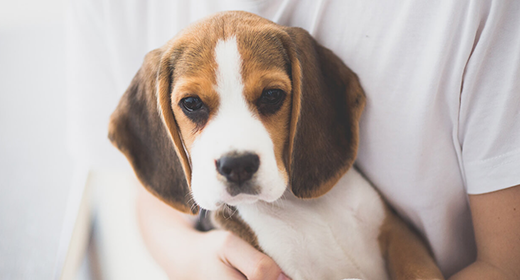

Bringing a new furry friend home is one of the most exciting things you will experience. And as a pet parent, the first thing you need to do is lay down a puppy vet care plan. Hence, it is essential that you take your new, little pet for a general check-up within the first week of bringing it home. During this vet visit, you can learn about your dog’s vaccination schedule, nutritional requirement, training needs, and more. It is crucial to seek professional medical advice to make sure that you do not overlook any aspects that may need immediate attention. If you are not sure why and when you need a vet for your dog, this article is for you. It gives you a gist on how often you should visit your vet, vaccinations, annual check-ups, and more.
A veterinarian is going to help you keep your floofy healthy and in check. A puppy, just like a senior dog, will require more attention. So, if you are wondering how often a puppy should go to a vet, here’s your answer: once every 3-4 weeks. If your puppy requires special attention, your veterinarian will recommend frequent follow-ups. If this is your pup’s first vet visit, contact the breeder for information on vaccination and any other medical history. If you have a rescue pup, let your vet know. It will help your doctor assess your pup’s case better.
Moreover, take your puppy to the doctor immediately if you notice any of the following issues:
Note: Even if your dog comes with a documentation of up-to-date vaccination shots, you should take it to the vet at least once to get a green signal.
We humans visit our family doctors at least once a year even if we do not exhibit any symptoms. Similarly, even your fur baby needs to be taken to the vet once a year for annual vaccination and a general medical check-up The vet will check your baby’s heart, lungs, ears, eyes, look for any abnormal growth, and do other basic tests.
Based on the medical examination, your vet may recommend certain dietary changes, physical activities, and a dental care routine. Follow their recommendations religiously to improve your puppy’s health! Here are a few things you can carry during your dog’s yearly appointment:
Puppies are born with some immunity passed on to them by their mothers. However, they start losing their inherited immunity once they turn 6 to 8 weeks old. Therefore, it becomes imperative that you start vaccinating your puppy around that time. Their innate habit of sniffing and licking everything that strikes their fancy exposes dogs to a plethora of diseases. Thankfully, a vaccination plan can shield them against fatal viruses and diseases. Vaccine shots are administered when puppies turn 6-8 weeks old, and they are repeated every 2-4 weeks until the puppy is 16 weeks of age or older. Sometimes, a vet may recommend an earlier vaccination regimen, starting at 4 weeks of age in the face of an outbreak or when the mother has an unknown vaccination history. You can ask your vet for a vaccination schedule customised for your puppy.
As kids, we were inoculated against several health issues with different types of vaccination. Similarly, your dog too needs to be vaccinated against multiple diseases such as rabies, distemper, hepatitis, etc. So, Let’s take a look at the types of vaccines commonly administered to your dog:
The above vaccines may come in different combinations; hence, consult your vet and get a proper understanding of
During the first year, your puppy will visit its vet frequently to get vaccination shots. Once your dog is fully vaccinated, you can consult your vet as and when required. However, do not forget to go for annual vet examinations to rule out serious health problems.
If this is your puppy’s first vet visit, you should speak with the breeder or shelter to understand if they have already administered any vaccinations on your puppy. Moreover, your vet must know if the deworming process has already begun. In case your pup is on any medicines or supplements, carry it along. Inform the veterinarian about its diet or any concerning issue.
If the puppy is less than 4 months old, you should take your pup to the vet every 3 or 4 weeks. Once it is eligible for vaccinations, your veterinarian shall provide you with a schedule. Take your puppy to the vet as per that schedule to ascertain that your puppy is fully vaccinated.


As a new puppy parent, you may feel overwhelmed by the sheer amount of information available on properly feeding your furry friend. But don't worry – we are here to help! In this blog post, we will share tips and tricks on puppy feeding, so your canine companion gets all the nourishment it needs to grow and thrive.
First and foremost, it's important to follow a consistent feeding schedule for puppies. This will help them get used to regular meals and prevent them from developing bad habits like begging for food. It's also essential to choose a high-quality puppy food formulated specifically for their age and size. Look for options containing real, wholesome ingredients and avoid anything packed with fillers or additives.
Overfeeding your puppy can lead to obesity and other health issues. It's also important to pay attention to portion sizes. And if you need help with how much to feed a puppy, feel free to ask your veterinarian for guidance.
Puppies have specific nutritional needs that change as they grow and develop. It is crucial to ensure they get the right amount of food at the right time. Our puppy feeding guide is designed to help you determine the appropriate serving size for your puppy based on age and weight. Following these guidelines ensures that your puppy gets the nutrition it needs to thrive and stay healthy.
[Puppy Feeding Chart]
Puppies are energetic and adorable little creatures, but they also require proper nutrition to grow and develop properly. So, how much should you feed a puppy?
Firstly, it's important to consider the size and breed of your puppy. Larger breeds will need more food, while smaller breeds will need less. It's also important to consider the puppy's age. Puppies under 12 weeks of age should be fed four times a day, while puppies over 12 weeks of age should be fed three times a day.
Regarding the amount of food, it's best to follow the guidelines on your puppy's food label. These guidelines are based on the puppy's weight and age and will ensure that your puppy is getting the right amount of nutrients. It's also essential to choose a high-quality puppy food developed specifically for puppies, as this will provide all the nutrients you puppy needs.
It's also important to remember that puppies have small stomachs and may need to eat smaller meals more frequently. If your puppy seems hungry between meals, you can offer them a small, healthy snack, such as a piece of cooked chicken or a small amount of carrot.
In summary, feeding your puppy the right amount of food at the correct time is important. Follow the guidelines on your puppy's food label and choose high-quality puppy food to ensure that your furry friend gets the nutrients required to grow into a healthy dog. Remember to consider your puppy's size and age, and offer small, healthy snacks as needed. Your puppy will grow into a healthy and happy dog with proper feeding.
The general rule of thumb is to switch your puppy to adult food when they reach around 80% of its expected adult size. This usually occurs when it is 12 to 18 months old, depending on the breed. Smaller breeds tend to reach adult size faster, while larger breeds may take longer.
To determine when your puppy is ready for the switch, it's important to pay attention to their body condition and weight. If your puppy is still growing rapidly and has a lot of energy, they are probably still being prepared for adult food. On the other hand, if they are starting to slowdown in growth and seem to be reaching their adult size, it's time to make the switch.
It's also a good idea to consult with your veterinarian for advice on when to switch your puppy to adult food. They can help you determine the best time based on your puppy's specific needs and growth rate.
In general, choosing high-quality adult food that is appropriate for your puppy's size and breed is imperative. Look for a formula rich in proteins, vitamins, and minerals to support their overall health and development. With careful planning and attention, you can ensure that your puppy grows into a healthy, happy adult dog.

